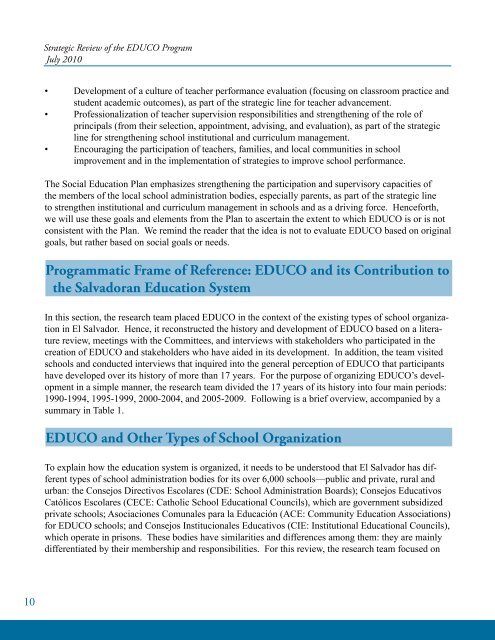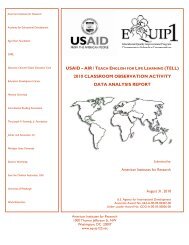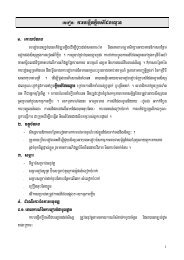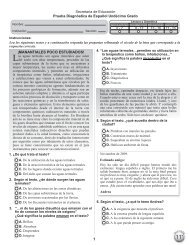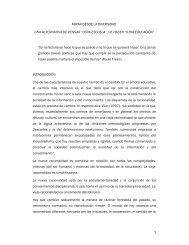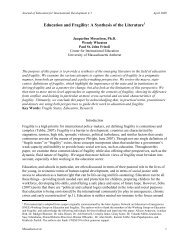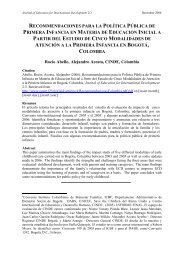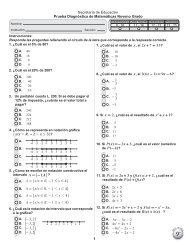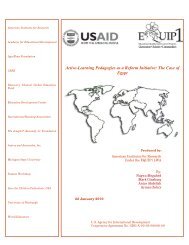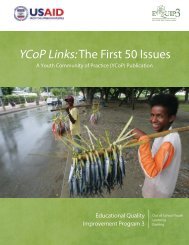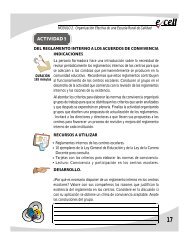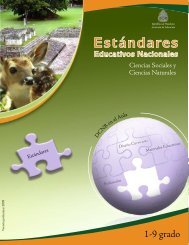Strategic Review of the EDUCO Program - EQUIP123.net
Strategic Review of the EDUCO Program - EQUIP123.net
Strategic Review of the EDUCO Program - EQUIP123.net
You also want an ePaper? Increase the reach of your titles
YUMPU automatically turns print PDFs into web optimized ePapers that Google loves.
<strong>Strategic</strong> <strong>Review</strong> <strong>of</strong> <strong>the</strong> <strong>EDUCO</strong> <strong>Program</strong>July 2010• Development <strong>of</strong> a culture <strong>of</strong> teacher performance evaluation (focusing on classroom practice andstudent academic outcomes), as part <strong>of</strong> <strong>the</strong> strategic line for teacher advancement.• Pr<strong>of</strong>essionalization <strong>of</strong> teacher supervision responsibilities and streng<strong>the</strong>ning <strong>of</strong> <strong>the</strong> role <strong>of</strong>principals (from <strong>the</strong>ir selection, appointment, advising, and evaluation), as part <strong>of</strong> <strong>the</strong> strategicline for streng<strong>the</strong>ning school institutional and curriculum management.• Encouraging <strong>the</strong> participation <strong>of</strong> teachers, families, and local communities in schoolimprovement and in <strong>the</strong> implementation <strong>of</strong> strategies to improve school performance.The Social Education Plan emphasizes streng<strong>the</strong>ning <strong>the</strong> participation and supervisory capacities <strong>of</strong><strong>the</strong> members <strong>of</strong> <strong>the</strong> local school administration bodies, especially parents, as part <strong>of</strong> <strong>the</strong> strategic lineto streng<strong>the</strong>n institutional and curriculum management in schools and as a driving force. Henceforth,we will use <strong>the</strong>se goals and elements from <strong>the</strong> Plan to ascertain <strong>the</strong> extent to which <strong>EDUCO</strong> is or is notconsistent with <strong>the</strong> Plan. We remind <strong>the</strong> reader that <strong>the</strong> idea is not to evaluate <strong>EDUCO</strong> based on originalgoals, but ra<strong>the</strong>r based on social goals or needs.<strong>Program</strong>matic Frame <strong>of</strong> Reference: <strong>EDUCO</strong> and its Contribution to<strong>the</strong> Salvadoran Education SystemIn this section, <strong>the</strong> research team placed <strong>EDUCO</strong> in <strong>the</strong> context <strong>of</strong> <strong>the</strong> existing types <strong>of</strong> school organizationin El Salvador. Hence, it reconstructed <strong>the</strong> history and development <strong>of</strong> <strong>EDUCO</strong> based on a literaturereview, meetings with <strong>the</strong> Committees, and interviews with stakeholders who participated in <strong>the</strong>creation <strong>of</strong> <strong>EDUCO</strong> and stakeholders who have aided in its development. In addition, <strong>the</strong> team visitedschools and conducted interviews that inquired into <strong>the</strong> general perception <strong>of</strong> <strong>EDUCO</strong> that participantshave developed over its history <strong>of</strong> more than 17 years. For <strong>the</strong> purpose <strong>of</strong> organizing <strong>EDUCO</strong>’s developmentin a simple manner, <strong>the</strong> research team divided <strong>the</strong> 17 years <strong>of</strong> its history into four main periods:1990-1994, 1995-1999, 2000-2004, and 2005-2009. Following is a brief overview, accompanied by asummary in Table 1.<strong>EDUCO</strong> and O<strong>the</strong>r Types <strong>of</strong> School OrganizationTo explain how <strong>the</strong> education system is organized, it needs to be understood that El Salvador has differenttypes <strong>of</strong> school administration bodies for its over 6,000 schools—public and private, rural andurban: <strong>the</strong> Consejos Directivos Escolares (CDE: School Administration Boards); Consejos EducativosCatólicos Escolares (CECE: Catholic School Educational Councils), which are government subsidizedprivate schools; Asociaciones Comunales para la Educación (ACE: Community Education Associations)for <strong>EDUCO</strong> schools; and Consejos Institucionales Educativos (CIE: Institutional Educational Councils),which operate in prisons. These bodies have similarities and differences among <strong>the</strong>m: <strong>the</strong>y are mainlydifferentiated by <strong>the</strong>ir membership and responsibilities. For this review, <strong>the</strong> research team focused on10


